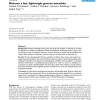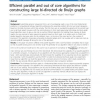37 search results - page 3 / 8 » Assembly of Large Genomes from Paired Short Reads |
BMCBI
2008
13 years 5 months ago
2008
Background: Metagenomics is an approach to the characterization of microbial genomes via the direct isolation of genomic sequences from the environment without prior cultivation. ...
BMCBI
2011
12 years 11 months ago
2011
Background: Next-generation sequencing technologies allow genomes to be sequenced more quickly and less expensively than ever before. However, as sequencing technology has improve...
BMCBI
2007
13 years 5 months ago
2007
Background: Genome assemblers have grown very large and complex in response to the need for algorithms to handle the challenges of large whole-genome sequencing projects. Many of ...
FPL
2010
Springer
13 years 3 months ago
2010
Springer
We demonstrate how Field Programmable Gate Arrays (FPGAs) may be used to address the computing challenges associated with assembling genome sequences from recent ultra-high-through...
BMCBI
2010
13 years 5 months ago
2010
Background: Assembling genomic sequences from a set of overlapping reads is one of the most fundamental problems in computational biology. Algorithms addressing the assembly probl...


